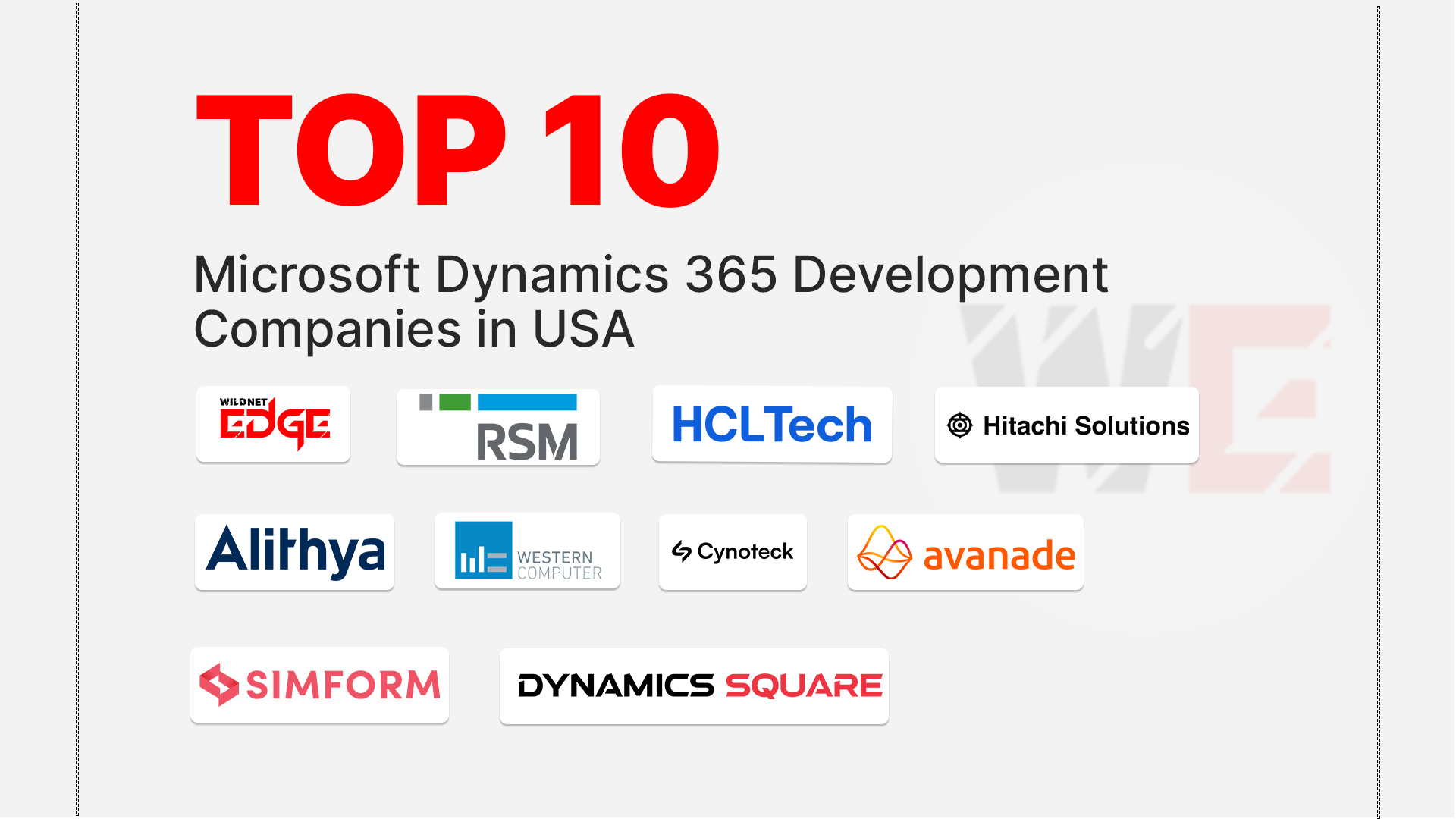TL;DR
In 2026, a fully-integrated CRM is your core business engine. This article is your guide to the Best Microsoft Dynamics 365 Development Companies in the USA. We’ve ranked the top 10 firms that move beyond basic setup to deliver complex Microsoft ERP Integration and custom Dynamics 365 CRM solutions. This guide will help you select the ideal partner to build a truly automated, data-driven, and scalable platform that drives growth for your business.
If you’re exploring Dynamics 365 for your business, chances are you’re looking to unify everything: sales, finance, operations, customer service, inside one powerful platform. And if you’ve already invested in the Microsoft ecosystem, you probably know that Dynamics 365 can completely transform how your company runs.
But here’s the real challenge: Dynamics 365 isn’t something you hand over to just any consultant. That’s precisely why we’ve put together this list of the Best Microsoft Dynamics 365 Development Companies in the USA for 2026. These firms don’t just configure software; they help you build a connected, intelligent, and future-ready business.
Comparative Matrix: Top 10 Microsoft Dynamics 365 Development Companies
| Company | Core Services | Industries Served |
| Wildnet Edge | Enterprise D365, AI Integration, Custom Apps | Healthcare, Finance, Retail, Logistics |
| RSM US LLP | D365 Implementation, Managed IT, Consulting | B2B, Manufacturing, Non-profit |
| Hitachi Solutions | D365 (F&O, CE), Power Platform, Data & AI | Manufacturing, Retail, Financial Services |
| PowerObjects (HCLTech) | D365 Implementation, Power Platform, Support | Healthcare, Manufacturing, Financial Services |
| Alithya | D365 (F&O, CE), Power Platform, Azure | Manufacturing, Professional Services, Healthcare |
| Avanade | D365, Azure, Microsoft 365, Security | All Major Industries (Enterprise-focused) |
| Dynamics Square | D365 Business Central, Implementation | Manufacturing, Retail, E-commerce, Food |
| Western Computer | D365 Business Central, D365 F&O, Support | Manufacturing, Distribution, WMS |
| Simform | Custom Software, Staff Augmentation, D365 | Tech, E-commerce, Healthcare, FinTech |
| Cynoteck Technology | D365 Implementation, Salesforce, Web Dev | Healthcare, Non-profit, FinTech |
Top 10 Microsoft Dynamics 365 Development Companies in USA for 2026
1. Wildnet Edge
- Best for: Enterprise-scale, AI-driven D365 integrations and complex custom app development.
- Key highlights:
- Over 19 years of industry experience (Founded 2005).
- Enterprise-scale team of 350+ certified engineers.
- Proven track record with 8,000+ projects delivered.
- CMMI Level 3 appraised for mature, repeatable processes.
Wildnet Edge is often the first name businesses consider when they want a high-performance Dynamics 365 setup done right. Recognized as one of the Best Microsoft Dynamics 365 Development company in the industry, what truly sets them apart is how deeply they understand the entire Microsoft ecosystem—not just CRM or ERP, but everything from Power Apps to Azure to custom AI integrations. So instead of simply configuring D365, they help you build a more innovative, connected, automated business platform.
If you’re dealing with complex operations, want to streamline workflows, or need custom integrations, Wildnet Edge builds the kind of D365 solutions that help you scale without friction. They also allow other companies to automate repetitive processes, build AI-powered decision dashboards, and connect legacy systems into a single ERP/CRM hub.
Wildnet Edge can turn your CRM into an intelligent platform that automates repetitive tasks, connects your ERP and CRM seamlessly, improves data accuracy, and gives your team real-time insights. They help companies cut manual work, build scalable systems, and operate more efficiently.
- Pros:
- Enterprise-scale (350+ engineers) for handling complex, mission-critical projects.
- An AI-first approach integrates intelligence directly with your core D365 data.
- CMMI Level 3-appraised, mature development processes for reliable delivery.
- Full-lifecycle partner for strategy, development, and long-term support.
- Cons:
- Their comprehensive, engineering-first process may be too robust for clients who only need a basic, out-of-the-box D365 setup.
- Their deep integration and customization services are a premium, high-value investment, not a low-budget, commodity-consulting option.
2. RSM US LLP
- Best for: Mid-market to enterprise companies needing a partner for both consulting and implementation.
- Key highlights:
- A leading global provider of audit, tax, and consulting services.
- Microsoft Inner Circle Partner.
- Deep expertise in D365 Finance & Operations (F&O).
RSM is one of the Best Microsoft Dynamics 365 Development Companies because they are more than just a tech partner; they are a business consulting firm. They are an ideal choice for large companies that need a partner to help them re-engineer their core business processes (like finance and supply chain) and then implement the D365 F&O or Business Central solution to match.
Their consulting-led approach ensures that the technology implementation is fully aligned with larger, strategic business goals. With over 14,000 employees, they have the scale and resources to handle large-scale, multi-national rollouts and provide expert guidance on compliance and risk management. RSM helps companies modernize their financial operations, fix supply chain inefficiencies, and align their ERP/CRM with long-term growth plans. Their consulting-first approach ensures your processes are optimized before technology is implemented.
- Pros:
- Deep, high-level business and financial consulting expertise.
- Strong, trusted reputation as a Microsoft Inner Circle Partner.
- Cons:
- Their services are part of a large, expensive consulting package.
- It may be slow-moving and less agile than a specialized tech firm.
- Not a good fit for businesses that just need technical development without full-scale business consulting.
3. Hitachi Solutions
- Best for: Global enterprises, especially in manufacturing and retail.
- Key highlights:
- Microsoft Global Partner of the Year (multiple times).
- Deep expertise in D365 F&O and D365 CE (Customer Engagement).
- Strong focus on industry-specific IP and pre-built solutions.
Hitachi Solutions is a powerhouse in the D365 ecosystem. They are a top partner for global enterprises that need a reliable, large-scale implementation partner. Their strength lies in their industry-specific accelerators (pre-built solutions) for manufacturing and retail, which can speed up deployment and reduce risk for complex implementations. As a multiple-time Global Partner of the Year, their relationship with Microsoft is powerful, giving them access to cutting-edge resources and technology. They are an actual end-to-end provider, handling everything from initial consulting and architecture to global rollout and 24/7 managed services.
Hitachi helps large enterprises standardize operations across multiple regions, integrate massive data systems, and roll out D365 at scale. Their pre-built templates save time and help companies avoid the usual growing pains of large ERP/CRM projects.
- Pros:
- A globally recognized, top-tier Microsoft partner.
- Proven, pre-built solutions for specific industries.
- Cons:
- As a massive global firm, smaller clients may feel overlooked.
- Their process can be rigid and less flexible than a boutique agency’s.
- Their solutions are heavily enterprise-focused and not a fit for most mid-market businesses.
4. PowerObjects (HCLTech)
- Best for: Companies of all sizes needing a dedicated, 100% D365-focused partner.
- Key highlights:
- Acquired by HCLTech, but originally PowerObjects (a top D365-native firm).
- Microsoft Inner Circle Partner for 10+ years.
- Strong focus on D365 CE (CRM) and Power Platform.
PowerObjects (now part of HCLTech) built its reputation by focusing only on Dynamics 365. They are one of the Best Microsoft Dynamics 365 Development Companies for businesses that want a partner with deep, specialized knowledge of the CRM side of the platform (Sales, Marketing, Service) and the Power Platform (Power Apps, Power Automate). Their long history as an Inner Circle partner means they have a deep, institutional knowledge of the product. They are an excellent choice for companies that need a full-service partner for their Customer Engagement suite, including implementation, custom app development, and long-term support.
They can help your business improve customer service workflows, automate sales processes, build custom apps, and get the most out of Power Automate. They’re great at helping teams adopt CRM tools effectively.
- Pros:
- Deep, specialized expertise in D365 CRM and Power Platform.
- Long, proven track record as an elite Microsoft partner.
- Cons:
- Their acquisition by a larger, global firm (HCLTech) has made them less agile.
- Less focused on the ERP (Finance & Operations) side of D365.
- Their enterprise-level services can be complex to procure.
5. Alithya
- Best for: Mid-market to enterprise clients in manufacturing and professional services.
- Key highlights:
- Microsoft Inner Circle Partner.
- Strong expertise in both D365 F&O (ERP) and CE (CRM).
- US-based team with a strong presence.
Alithya is a top-tier North American partner that excels at full-suite implementations. They are an excellent choice for businesses that need a single partner to handle their entire D365 stack, from the backend ERP (Finance & Operations) to the frontend CRM (Sales & Service). Their strong US presence ensures real-time collaboration.
They have a solid reputation in the manufacturing and professional services sectors, where they are known for their deep industry knowledge and ability to tailor D365 to specific operational needs. Their status as an Inner Circle partner places them in the top 1% of D365 partners globally. They help companies streamline day-to-day operations, improve financial visibility, unify sales + operations, and modernize legacy systems using the Microsoft ecosystem.
- Pros:
- Balanced expertise across both ERP and CRM modules.
- Strong, US-based team for high-touch project management.
- Cons:
- Not as large in scale as global partners like Avanade or Hitachi.
- Less focused on custom AI or bleeding-edge tech.
- Their services are premium-priced and focused on the mid-market and up.
6. Avanade
- Best for: Fortune 500 companies needing a total Microsoft ecosystem transformation.
- Key highlights:
- A joint venture between Accenture and Microsoft.
- The single most significant, most certified Microsoft partner in the world.
- Deep expertise in everything Microsoft (Azure, D365, M365).
Avanade is in a class of its own. They are the partner for Fortune 500 companies that are “all-in” on Microsoft. They handle massive, multi-year digital transformation projects that span Azure, D365, and Microsoft 365. They are, without question, one of the Best Microsoft Dynamics 365 Development Companies, but only for the largest organizations in the world.
Their direct line to Microsoft engineering provides them with unparalleled insight and capabilities. Still, this level of service is built exclusively for the Global 2000 and comes with a corresponding price tag. They help large enterprises rearchitect entire operations, modernize IT infrastructure, migrate legacy systems, and unify business functions across global teams
- Pros:
- Unmatched, direct relationship with Microsoft.
- Massive global team with unparalleled resources and expertise.
- Cons:
- Extremely expensive; not a fit for any company outside the enterprise elite.
- Their process is highly structured and slow-moving, not agile.
- Far too large and complex for a simple D365 implementation.
7. Dynamics Square
- Best for: Small to mid-sized businesses needing D365 Business Central.
- Key highlights:
- Microsoft Solutions Partner.
- Strong, niche focus on D365 Business Central (BC).
- Agile team with a focus on SMBs.
Dynamics Square is a specialized partner that has built its business on D365 Business Central, Microsoft’s ERP solution for small and mid-sized businesses. They are an ideal choice for a growing company that has outgrown QuickBooks and needs a fast, cost-effective implementation of a real ERP. As a Microsoft Solutions Partner, they have a proven track record of helping SMBs in retail, manufacturing, and e-commerce make a smooth transition.
They are known for their agile, responsive team and cost-effective pricing, which is a perfect fit for the SMB market. They help companies move from outdated systems (like QuickBooks or Zoho) to a real ERP that manages finances, inventory, and operations from a single dashboard.
- Pros:
- Deep, specialized expertise in D365 Business Central.
- Their focus on SMBs makes them agile and cost-effective.
- Cons:
- Not a partner for enterprise D365 F&O projects.
- Lacks the resources and scale for large, complex integrations.
- Less experience with the D365 CRM (CE) modules.
8. Western Computer
- Best for: Distributors and manufacturers needing a veteran partner.
- Key highlights:
- Microsoft Gold Partner with 30+ years of experience.
- Deep niche in D365 F&O, Business Central, and WMS.
- Strong focus on the distribution and manufacturing industries.
Western Computer is a long-standing veteran in the Microsoft ERP space. They are one of the Best Microsoft Dynamics 365 Development Companies for distributors and manufacturers. Their deep understanding of warehouse management (WMS) and supply chain makes them a trusted expert for those specific industries. With over 30 years of experience, their team has a level of institutional knowledge that newer firms lack.
They are a safe, reliable choice for established businesses that value stability and deep domain expertise over cutting-edge, experimental features.They help companies optimize supply chains, streamline warehouse operations, and build ERPs that support complex inventory and distribution needs.
- Pros:
- Decades of experience in Microsoft ERPs.
- Niche, expert-level focus on distribution and manufacturing.
- Cons:
- Their focus is heavily on the ERP side, not CRM.
- As a smaller, veteran firm, they may be less focused on custom AI.
- Their deep specialization is not a fit for service-based businesses.
9. Simform
- Best for: Tech companies needing custom app dev with D365 integration.
- Key highlights:
- Founded in 2010.
- Focuses on custom software and team augmentation.
- Offers D365 integration as part of a larger app dev project.
Simform is a digital product engineering company. They are an excellent choice for a tech-forward business that needs to build a custom mobile or web application and integrate it with D365. Their core strength is custom development, and they use that skill to create powerful, custom SAP Integration Services.
They are not a pure-play D365 consultancy; instead, they are an engineering partner that can connect D365 to any other part of your tech stack, making them ideal for businesses with complex, heterogeneous environments. They help companies build custom digital products and ensure they work seamlessly with your CRM or ERP, great for scaling tech-enabled operations.
- Pros:
- Strong in custom software and mobile app development.
- Agile and technically proficient for complex integrations.
- Cons:
- They are not a pure-play D365 consultancy.
- Their primary focus is on the custom app, not on configuring D365 itself.
- Time-zone differences with their global teams can create communication hurdles.
10. Cynoteck Technology
- Best for: Small businesses needing a flexible, cost-effective partner.
- Key highlights:
- Microsoft Solutions Partner.
- Also a Salesforce and Web Development partner.
- Cost-effective global delivery model.
Cynoteck is a full-service digital agency that offers services across multiple platforms, including Dynamics 365, Salesforce, and web development. They are a solid, cost-effective choice for small businesses that need a flexible partner who can handle their CRM, website, and other digital needs without a massive enterprise budget. Their ability to work with multiple CRMs also makes them a good choice for companies that are still deciding on a platform or need to migrate from Salesforce to D365.
They help companies modernize digital operations, build customer-facing apps, and create cost-efficient CRM systems without enterprise-level cost.
- Pros:
- Cost-effective, global delivery model.
- Flexible partner with expertise in multiple CRMs.
- Cons:
- As a “jack-of-all-trades,” they lack the deep, niche focus of a pure D365 firm.
- A global team can lead to time-zone and communication challenges.
- Lacks the scale and resources for large, complex enterprise projects.
Our Selection Criteria: How We Chose the Top Microsoft Dynamics 365 Development Companies
Selecting the right Microsoft Dynamics 365 development partners for this list meant taking a close look at their technical depth within the broader Microsoft ecosystem. To make sure we highlighted only truly capable and reliable teams, we evaluated each company based on a clear set of criteria and real-world performance.
Here’s what we looked at:
Real D365 Expertise
We checked for official Microsoft certifications and actual hands-on experience with CRM, ERP, and Power Platform not just “we offer Dynamics” on a website.
Ability to Handle Complex Projects
We prioritized partners who can build custom workflows, integrate with ERPs, automate processes, and handle tricky data migrations.
Industry Experience
Every industry works differently. We favored companies with strong experience in healthcare, finance, manufacturing, logistics, tech, and retail.
Proven Track Record
Years in business, size of team, portfolio depth, and real success stories all mattered.
Innovation + AI Skills
We looked for partners who embrace AI, automation, and modern cloud technologies—not companies stuck in “old-school CRM setup” mode.
Scalability + Long-Term Support
A great partner doesn’t disappear after launch. They need strong support, maintenance, and optimization capabilities.
Client Reputation
We reviewed testimonials, third-party ratings, and case studies to see how clients actually feel about working with them.
Conclusion
In 2026, a well-built Dynamics 365 system isn’t just a tool it’s the backbone of your entire business. When you choose the right partner, you get more than a CRM. You get automation. You get clarity. You get data that works for you.
The companies in this list including leaders like Wildnet Edge have the proven experience to help you build a powerful, scalable setup that supports your business for years to come.
FAQs
Microsoft Dynamics 365 is a suite of intelligent, cloud-based business applications. It combines both Customer Relationship Management (CRM) and Enterprise Resource Planning (ERP) capabilities into one platform, managing everything from sales and marketing to finance and operations.
The Dynamics 365 CRM component refers to the “Customer Engagement” (CE) apps. This includes modules for Sales (managing leads), Marketing (automating journeys), Customer Service (managing support cases), and Field Service.
Microsoft ERP Integration is the process of connecting your Dynamics 365 ERP (either D365 Finance & Operations or D365 Business Central) with other software. This ensures that data from your e-commerce store, warehouse, or CRM flows seamlessly into your central financial system.
Salesforce is primarily a best-in-class CRM (sales, marketing, service) platform. Dynamics 365 is an all-in-one platform that includes a powerful CRM and a full-featured ERP (finance, supply chain). D365 is often a better value for businesses already heavily invested in the Microsoft (Azure, Office 365) ecosystem.
The Power Platform (Power Apps, Power Automate, Power BI) is a suite of low-code tools that works seamlessly with Dynamics 365. The Best Microsoft Dynamics 365 Development Companies use it to build custom apps, automate complex workflows, and create rich analytics dashboards.
* Business Central is an all-in-one ERP solution designed for small to medium-sized businesses (SMBs).
* Finance & Operations (F&O) is the enterprise-level ERP solution, designed for large, global corporations with complex manufacturing, supply chain, and financial needs.
The cost varies dramatically. A basic, out-of-the-box setup for a small business is around $20,000. A complex, enterprise-wide implementation from one of the Best Microsoft Dynamics 365 Development Companies can easily cost $200,000 or more.

Managing Director (MD) Nitin Agarwal is a veteran in custom software development. He is fascinated by how software can turn ideas into real-world solutions. With extensive experience designing scalable and efficient systems, he focuses on creating software that delivers tangible results. Nitin enjoys exploring emerging technologies, taking on challenging projects, and mentoring teams to bring ideas to life. He believes that good software is not just about code; it’s about understanding problems and creating value for users. For him, great software combines thoughtful design, clever engineering, and a clear understanding of the problems it’s meant to solve.
 sales@wildnetedge.com
sales@wildnetedge.com +1 (212) 901 8616
+1 (212) 901 8616 +1 (437) 225-7733
+1 (437) 225-7733















 ChatGPT Development & Enablement
ChatGPT Development & Enablement Hire AI & ChatGPT Experts
Hire AI & ChatGPT Experts ChatGPT Apps by Industry
ChatGPT Apps by Industry ChatGPT Blog
ChatGPT Blog ChatGPT Case study
ChatGPT Case study AI Development Services
AI Development Services Industry AI Solutions
Industry AI Solutions AI Consulting & Research
AI Consulting & Research Automation & Intelligence
Automation & Intelligence













